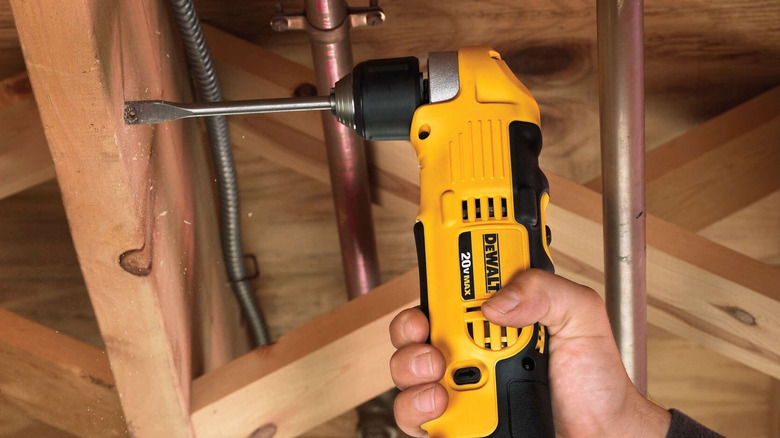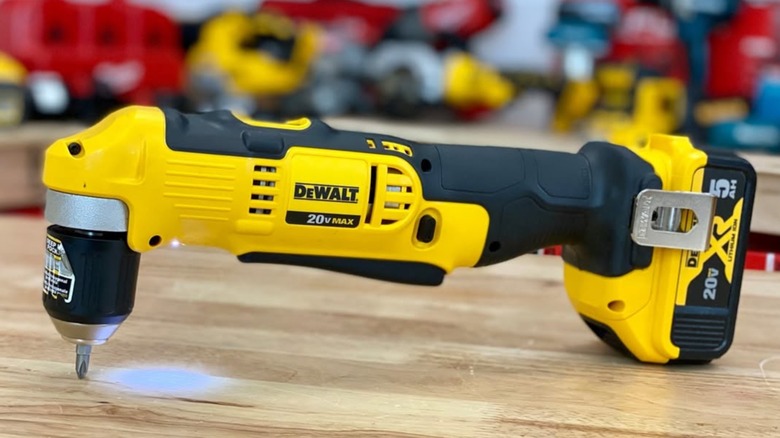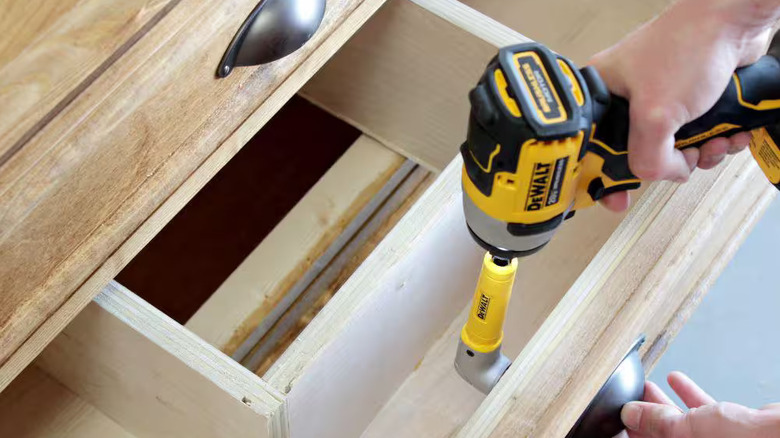Is DeWalt's Right Angle Drill Worth Buying? Here's What Reviews Say
We may receive a commission on purchases made from links.
How many people do you know who are both artists and scientists? Unfortunately, the ability to make sense of online product reviews has become both an art and a science in recent years. Products like DeWalt's DCD740B 20-Volt MAX Li-Ion Right-Angle Drill (you can learn how to decode the model numbers on DeWalt tools here) have reviews with wildly conflicting information, making an informed purchasing decision nearly impossible.
We have done the art-and-sciencing on this particular drill for you, and our verdict is this: It's a good drill, but don't buy it. We looked at reviews from purchasers of the tool and from professional tool reviewers, and things began to (mostly) add up. In spite of stellar Amazon reviews (4.7 stars on 2,742 ratings and reviews), the reviews on DeWalt's own website (3.0 stars on 37 reviews) were largely negative, with about half of them discussing how quickly and spectacularly the drill failed when doing work it was designed to do. Amazon reviewers, on the other hand, almost never mention failure, and those that do are mostly among the one-star reviewers — about 2% of the total.
It helps to understand what the tool is: a fairly ordinary battery-operated drill with a brushed motor designed for working in tight spaces (inside cabinetry, perhaps, or drilling holes in closely spaced wall studs). Its compactness is mostly achieved via the drill's chuck, which is at a right angle to the body of the device. Rather than having the pistol-like design of most drills, it has the elongated, narrow form factor of some other battery-operated DeWalt tools, like the DeWalt 20-Volt Max XR Oscillating Saw.
Reviewers explain and diagnose the drill's issues
People who have bought this drill mostly like it. Reviewer Karl sums up the general sentiment on DeWalt's website, saying, "This thing is so tough and durable, even taking a (ok, a few) 12 foot drop[s] onto concrete." Customers also like another space-saving feature, a void within the chuck to swallow the unnecessary length of 2-inch and larger hex bits, which DeWalt calls a "deep hex pocket." "I really like the built in ¼” chuck within the chuck," said Jason C. in a review on DeWalt's website. "My main use for it is driving pocket hole screws and this feature makes bit insertion really easy." (Note that this is not an officially sanctioned use of the chuck, which DeWalt's Instruction Manual says should be tightened even when the deep hex pocket is used.)
Professional reviewers like Project Farm's Todd Osgood bring the science: It's a little larger and heaver than average, but in low gear the DCD740 is a high-torque beast, easily boring holes well above its maximum 1.1-inch bit size. But in Osgood's tests and the experience of many reviewers, the drill has an unfortunate habit of "letting the smoke out" and then, usually, ceasing to work altogether. According to DeWalt reviewer Snagglewhen, "As soon as the drill encountered an obstacle with a larger bit the motor smoked and smell[ed] like burning plastic." Perhaps the most useful hint comes from Jerry in Alabama, who said on DeWalt's official site, "once it stalls the stall current smoked the motor before I managed to get off the trigger." The manual warns against this, and Osgood explains why: The DCD740 doesn't appear to have overload protection.
The right-angle drill is probably okay, but you still shouldn't buy it
Why does the DeWalt drill's insufficient overload protection matter if so many owners seem to love the tool? The problem only really arises when, as several reviewers noted, you continue to give the drill power after it has been stalled, usually by binding up a large bit. What happens is that a stuck brushed motor almost instantly begins to draw more amperage than its components are rated for, leading to overheating, damage, and failure. Many reviewers with failed drills mention this overheating. Maybe it wouldn't happen to you; it didn't happen to a vast majority of Amazon reviewers.
You could hold out for a more powerful brushless version, or one with better overload protection. But even then, the DCD740 isn't ideal. Reviewer Joe M on DeWalt's website recommends the drill, but notes that its "[h]ead is not much shorter than an impact head, so it really [doesn't] work well in all tight spots." And there are hints throughout the reviews that the plastics used in the drill's construction, particularly the gear-change mechanism, might be fragile. There's a better alternative, from DeWalt as well. Right-angle adapters for standard pistol-style drills are plentiful, and DeWalt's DWARA60 is one that often earns positive feedback. It's impact-rated, uses your existing drill or impact driver for power, and is far smaller than a dedicated right-angle drill. And while the DCD740 will currently cost you $159, almost twice its historic low of $79, you can pick up the DWARA60 right-angle adapter from for around $20.


